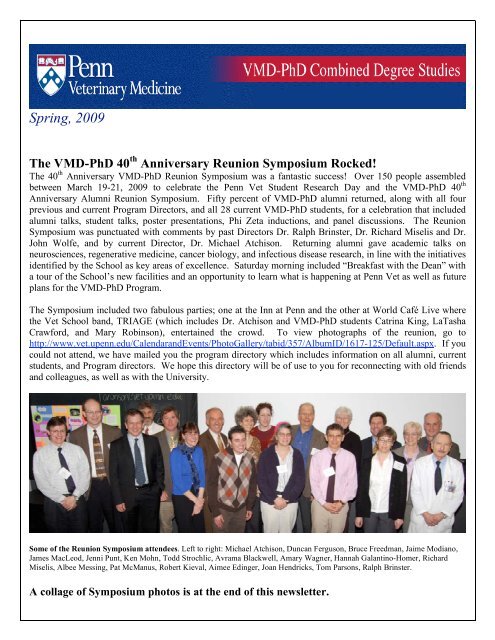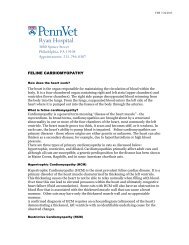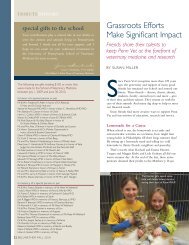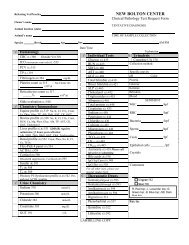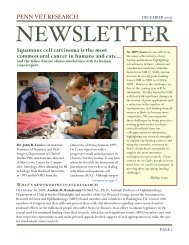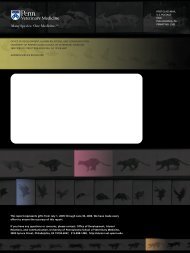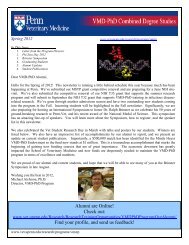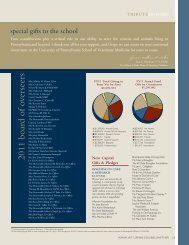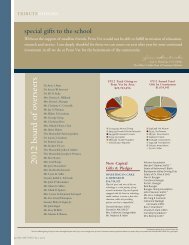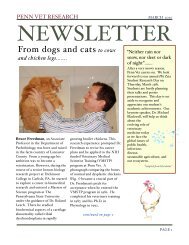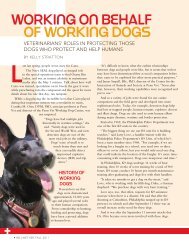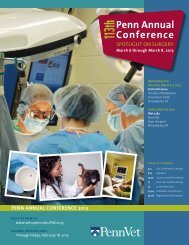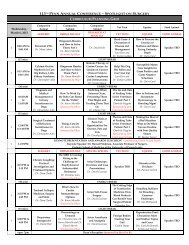Spring, 2009 - University of Pennsylvania School of Veterinary ...
Spring, 2009 - University of Pennsylvania School of Veterinary ...
Spring, 2009 - University of Pennsylvania School of Veterinary ...
Create successful ePaper yourself
Turn your PDF publications into a flip-book with our unique Google optimized e-Paper software.
<strong>Spring</strong>, <strong>2009</strong><br />
The VMD-PhD 40 th Anniversary Reunion Symposium Rocked!<br />
The 40 th Anniversary VMD-PhD Reunion Symposium was a fantastic success! Over 150 people assembled<br />
between March 19-21, <strong>2009</strong> to celebrate the Penn Vet Student Research Day and the VMD-PhD 40 th<br />
Anniversary Alumni Reunion Symposium. Fifty percent <strong>of</strong> VMD-PhD alumni returned, along with all four<br />
previous and current Program Directors, and all 28 current VMD-PhD students, for a celebration that included<br />
alumni talks, student talks, poster presentations, Phi Zeta inductions, and panel discussions. The Reunion<br />
Symposium was punctuated with comments by past Directors Dr. Ralph Brinster, Dr. Richard Miselis and Dr.<br />
John Wolfe, and by current Director, Dr. Michael Atchison. Returning alumni gave academic talks on<br />
neurosciences, regenerative medicine, cancer biology, and infectious disease research, in line with the initiatives<br />
identified by the <strong>School</strong> as key areas <strong>of</strong> excellence. Saturday morning included “Breakfast with the Dean” with<br />
a tour <strong>of</strong> the <strong>School</strong>’s new facilities and an opportunity to learn what is happening at Penn Vet as well as future<br />
plans for the VMD-PhD Program.<br />
The Symposium included two fabulous parties; one at the Inn at Penn and the other at World Café Live where<br />
the Vet <strong>School</strong> band, TRIAGE (which includes Dr. Atchison and VMD-PhD students Catrina King, LaTasha<br />
Crawford, and Mary Robinson), entertained the crowd. To view photographs <strong>of</strong> the reunion, go to<br />
http://www.vet.upenn.edu/CalendarandEvents/PhotoGallery/tabid/357/AlbumID/1617-125/Default.aspx. If you<br />
could not attend, we have mailed you the program directory which includes information on all alumni, current<br />
students, and Program directors. We hope this directory will be <strong>of</strong> use to you for reconnecting with old friends<br />
and colleagues, as well as with the <strong>University</strong>.<br />
Some <strong>of</strong> the Reunion Symposium attendees. Left to right: Michael Atchison, Duncan Ferguson, Bruce Freedman, Jaime Modiano,<br />
James MacLeod, Jenni Punt, Ken Mohn, Todd Strochlic, Avrama Blackwell, Amary Wagner, Hannah Galantino-Homer, Richard<br />
Miselis, Albee Messing, Pat McManus, Robert Kieval, Aimee Edinger, Joan Hendricks, Tom Parsons, Ralph Brinster.<br />
A collage <strong>of</strong> Symposium photos is at the end <strong>of</strong> this newsletter.
Page 2 <strong>Spring</strong>, <strong>2009</strong><br />
Student Research Day VMD-PhD Winners<br />
The VMD-PhD Reunion Symposium overlapped the Penn Vet Student Research Day celebrations that included<br />
posters and talks by Penn Vet students conducting research. Out <strong>of</strong> dozens <strong>of</strong> submissions a small number <strong>of</strong><br />
students were selected for oral presentations. VMD-PhD students specially chosen for presentations are<br />
highlighted below. The day was capped with a keynote address by Penn alumnus, Michael Kotlik<strong>of</strong>f,<br />
VMD/PhD, who now serves as the Austin O. Hooey Dean <strong>of</strong> Cornell <strong>University</strong>, followed by a reception and<br />
then a dinner for VMD-PhD alumni and current VMD-PhD students.<br />
First Place VMD-PhD Award: Catrina King<br />
Let-7 microRNAs Suppress Tumorogenesis and<br />
Promote Differentiation in the Colon.<br />
Catrina is a 5 th year student performing her thesis research in the<br />
lab <strong>of</strong> Dr. Anil Rustgi. Her research focuses on let-7 microRNAs<br />
in colorectal malignancy and intestinal differentiation.<br />
Third Place VMD-PhD Award: LaTasha<br />
Crawford<br />
The Increased Intrinsic Excitability <strong>of</strong> lwDR 5-HT<br />
Neurons may be the Cellular Basis for Stress-Induced<br />
Neuronal Activation<br />
LaTasha is a 6 th year student performing thesis research in<br />
the laboratory <strong>of</strong> Dr. Sheryl Beck. Her work focuses on<br />
anxiety and depression related disorders that are believed<br />
to be controlled by the serotonin system.<br />
Second Place VMD-PHD Award: Jeffrey<br />
Patterson-Fortin<br />
MERIT40 Controls BRCA1-Rap80-Complex<br />
Integrity and Recruitment to DNA Double Strand<br />
Breaks.<br />
Jeffrey is a 4 th year student performing thesis research in the<br />
laboratory <strong>of</strong> Dr. Roger Greenberg. His work focuses on<br />
components <strong>of</strong> the BRCA-1-dependent signaling networks that<br />
repair damage and suppress breast and ovarian cancer.
Page 3 <strong>Spring</strong>, <strong>2009</strong><br />
Hill Student Inspiration Awards for <strong>2009</strong> include two VMD-PhD students!<br />
The Penn Vet Student Inspiration Awards are presented to currently enrolled Penn Vet students who<br />
demonstrate the potential to significantly advance the frontiers <strong>of</strong> veterinary medicine. Two awards are given<br />
each year, and both awards this year include current VMD-PhD students.<br />
Left to right: Catherine Brinkley (VMD/PhD Student), Laurel Redding (VMD/PhD Student), Alison Barnstable (VMD Student)<br />
Catherine Brinkley, is a second-year student enrolled in the <strong>School</strong>’s VMD-PhD program. Her winning<br />
project is entitled “Design for Health.” Her plan blends veterinary medicine with city planning to create a<br />
unified and cross-disciplinary approach to animal care and urban life. “I am honored and beyond thrilled to be<br />
chosen for the Inspiration Award,” she said. “The prospect <strong>of</strong> bringing Design for Health to life has been a<br />
dream for the past five years for me, and I am greatly indebted to the Hills and Penn Vet for giving me the<br />
chance to make it happen.” Ms. Brinkley also has been accepted into the Urban Planning PhD Program at Penn<br />
to pursue the study <strong>of</strong> “Design for Health: Planning Animal Facilities to Prevent Infectious Disease Spread.”<br />
Laurel Redding, a second year VMD-PhD student shared an award with Alison Barnstable (a<br />
current second year Vet Student). Their project is entitled “Increasing Agricultural Productivity in Developing<br />
Countries.” The project developed by Laurel and Alison involves a partnership with Heifer International, a<br />
non-pr<strong>of</strong>it organization dedicated to helping people produce their own food, with a program that encourages the<br />
development <strong>of</strong> para-pr<strong>of</strong>essional veterinary services to ensure the productivity <strong>of</strong> donated animals. They also<br />
plan to create opportunities for veterinary student volunteerism and research, and to increase the flow <strong>of</strong><br />
information concerning the needs <strong>of</strong> developing countries into veterinary schools in the U.S. “I am truly<br />
honored and thrilled to have received this award,” said Laurel. “The Inspiration Awards are a once-in-a-lifetime<br />
opportunity for us to make a contribution to veterinary medicine as students. I am very excited about launching<br />
this project and undertaking a meaningful collaboration with Heifer International in the field <strong>of</strong> global public<br />
health.” Alison commented, “I am so excited to receive this award, as it creates an opportunity for me to join<br />
the global health community, addressing the issues <strong>of</strong> health, poverty and hunger. This award will allow us to<br />
create a sustainable veterinary involvement in global health through collaboration with Heifer International. I<br />
hope this work will benefit veterinary students, animal health providers here and abroad and developing<br />
communities. I cannot thank Mr. and Mrs. Hill enough for their generosity.”
Page 4 <strong>Spring</strong>, <strong>2009</strong><br />
Dr. Frederick A. Murphy Awarded $100,000 Prize as<br />
<strong>2009</strong> Penn Vet World Award Recipient<br />
Dr. Frederick A. Murphy has been selected as the <strong>2009</strong> recipient <strong>of</strong> the<br />
Penn Vet World Leadership Award. Dr. Murphy is the James W.<br />
McLaughlin Pr<strong>of</strong>essor in Residence, Department <strong>of</strong> Pathology at the<br />
<strong>University</strong> <strong>of</strong> Texas Medical Branch at Galveston. The Penn Vet World<br />
Leadership Award is given annually to a veterinarian who has<br />
dramatically changed the practice and image <strong>of</strong> the pr<strong>of</strong>ession and<br />
substantially influenced the lives and careers <strong>of</strong> others. The award<br />
provides the recipient with $100,000 in unrestricted funding, the largest<br />
monetary award in veterinary medicine, underwritten by the Vernon and<br />
Shirley Hill Foundation.<br />
“As an internationally acclaimed authority in comparative virology, Dr.<br />
Murphy is a pioneering researcher, respected advisor in health policy and<br />
outstanding spokesperson for the veterinary pr<strong>of</strong>ession, which has led to his unparalleled contributions to<br />
veterinary medicine,” said Dr. Joan C. Hendricks, the Gilbert S. Kahn Dean <strong>of</strong> <strong>Veterinary</strong> Medicine. “We are<br />
proud to recognize his vast and impressive achievements with this year's Penn Vet World Leadership Award.”<br />
For more information go to: http://www.vet.upenn.edu/worldaward/<br />
Alumnus Highlight: Dr. Duncan Ferguson VMD, PhD, Diplomate, American College <strong>of</strong><br />
<strong>Veterinary</strong> Internal Medicine and American College <strong>of</strong> <strong>Veterinary</strong> Clinical Pharmacology<br />
Current position: Department Head and Pr<strong>of</strong>essor <strong>of</strong> Clinical Pharmacology, The <strong>University</strong> <strong>of</strong> Illinois at<br />
Urbana-Champaign College <strong>of</strong> <strong>Veterinary</strong> Medicine, Urbana, IL<br />
After completing a degree in Chemistry from Dartmouth College in 1975,<br />
Duncan Ferguson entered the VMSTP in the summer <strong>of</strong> 1975 with plans to<br />
learn about Penn, its research community and the Philadelphia Phillies.<br />
Working with his VMSTP mentor Bill Lawrence, a virologist, he spent the<br />
summer before vet school learning the ropes <strong>of</strong> the university, and adapting to<br />
the big city. During subsequent vet school summers, he worked in smooth<br />
muscle physiology with Ronald Coburn, equine endocrinology with<br />
Venkataseshu Ganjam (now at the <strong>University</strong> <strong>of</strong> Missouri) at New Bolton<br />
Center, and then settled in the laboratory <strong>of</strong> Dr. Robert Utiger (recently<br />
deceased), then head <strong>of</strong> the Endocrine Section <strong>of</strong> HUP. Duncan then began a<br />
lifelong interest in comparative endocrinology with a focus on the basic and<br />
clinical aspects <strong>of</strong> the thyroid gland. One year into his Ph.D. studies on thyroid hormone metabolism by the<br />
isolated perfused rat kidney, Bob Utiger moved to the <strong>University</strong> <strong>of</strong> North Carolina to take on leadership <strong>of</strong><br />
their MD/PhD program. Duncan’s mentor then became Tony Jennings MD, whose work on the isolated<br />
perfused rat liver became a model for Duncan’s Ph.D. More importantly, Tony became a role model as a<br />
clinician investigator. To this day, he wonders why veterinary medicine has not been more successful at<br />
developing training programs such as the subspecialty clinical and basic research fellowships provided in<br />
human medicine.<br />
After completing the VMD/PhD Program in 1981, Duncan performed a residency in small animal internal<br />
medicine, completing his first year as resident in the “old” hospital and the second in the current small animal<br />
teaching hospital, then called just “VHUP.” During this time, he solidified his interest in clinical<br />
endocrinology. Over the study <strong>of</strong> thyroid function tests in cats using some <strong>of</strong> Mark Haskins’ colony cats kept in
Page 5 <strong>Spring</strong>, <strong>2009</strong><br />
gang housing (Duncan still has the scars to prove it), he met and later married Dr. Margarethe Hoenig, then a<br />
resident in small animal internal medicine.<br />
After Margarethe completed her Ph.D. at the Medical <strong>School</strong> at Penn, they were recruited to Cornell <strong>University</strong>.<br />
After 3 years in Ithaca, they moved to the <strong>University</strong> <strong>of</strong> Georgia College <strong>of</strong> <strong>Veterinary</strong> Medicine where two<br />
faculty positions were available in the Department <strong>of</strong> Physiology and Pharmacology. Working independently<br />
and in collaboration, they were on the faculty at UGA for over 20 years teaching graduate and pr<strong>of</strong>essional<br />
courses. Duncan’s research focused on thyroid hormone metabolism in the kidney, the etiopathogenesis <strong>of</strong><br />
feline hyperthyroidism, the improvement <strong>of</strong> thyroid function tests in domestic animals, and collaboration with<br />
Margarethe on studies <strong>of</strong> the control <strong>of</strong> insulin secretion and on the obese cat model <strong>of</strong> insulin resistance.<br />
Bridging the clinical and basic problems in endocrinology always seemed like a natural connection for the two<br />
parts <strong>of</strong> their training.<br />
During his time at UGA, Duncan was in the first cohort completing board certification by the American College<br />
<strong>of</strong> <strong>Veterinary</strong> Clinical Pharmacology, later serving as the specialty’s Vice President and on its Examination<br />
Committee. He was a founding member <strong>of</strong> the Society <strong>of</strong> Comparative Endocrinology in 1983, also serving as<br />
its Vice President. He served on the advisory board <strong>of</strong> the Morris Animal Foundation and is currently serving<br />
his second stint on the board. In 1990, he was one <strong>of</strong> the original founders <strong>of</strong> <strong>Veterinary</strong> Information Network,<br />
and later headed VIN’s online Continual Education programs.<br />
On the research front, in the late 1990’s, his focus turned to molecular genetic studies <strong>of</strong> feline, canine and<br />
equine TSH, cloning and expressing each. He initiated the DVM/PhD program at the <strong>University</strong> <strong>of</strong> Georgia and<br />
successfully brought a summer T35 training grant to UGA. Within the last 6 years, he returned to his roots in<br />
comparative thyroid hormone metabolism, joining a team <strong>of</strong> researchers from the UGA, the <strong>University</strong> <strong>of</strong><br />
Massachusetts and the Enviromental Protection Agency, to study the role <strong>of</strong> thyroid disruptors in<br />
neurodevelopment.<br />
In 2006, he took the position <strong>of</strong> Department Head and Pr<strong>of</strong>essor <strong>of</strong> Clinical Pharmacology in the Department <strong>of</strong><br />
<strong>Veterinary</strong> Biosciences at the <strong>University</strong> <strong>of</strong> Illinois. The strengths <strong>of</strong> this department reside in reproductive,<br />
endocrine, and developmental toxicology and comparative pharmacology, so he feels quite at home with the<br />
science in his new department. A particular challenge has been to re-establish the historical strengths in<br />
residency training in veterinary clinical pharmacology and veterinary clinical toxicology. In his current role, he<br />
is on the internal steering committee <strong>of</strong> the <strong>University</strong> <strong>of</strong> Illinois Division <strong>of</strong> Biomedical Sciences, and is on the<br />
steering and admissions committee for the <strong>Veterinary</strong> Medical Scholars (DVM/PhD) program, and is currently<br />
mentoring a student’s Ph.D. in this program. Current research focuses on the study <strong>of</strong> the regulatory role <strong>of</strong><br />
thyroid hormone uptake and metabolism on thyroid-hormone dependent neurodevelopment using rodent and<br />
human embryonic stem neuroprogenitor models, and collaborative work on the feline model <strong>of</strong> insulin<br />
resistance.<br />
From the philosophical side, Duncan feels that research training and academic veterinary medicine have<br />
changed greatly in the 34 years since he entered the program. The combined degree training has proven to be<br />
both “a blessing and a curse,” but mostly a blessing because <strong>of</strong> the many opportunities it has created. Now in<br />
the business <strong>of</strong> hiring academic scientists to teach in a veterinary school, he recognizes that the broad veterinary<br />
training <strong>of</strong> the veterinarian is a huge asset in research as well as teaching. “Whole animal” morphologists,<br />
physiologists and pharmacologists, for example, no longer are being trained in Ph.D. programs. The “curse”<br />
might have been associated with his personal interest in maintaining basic and clinical science interests when<br />
the funding opportunities have always been much less for animal-focused disease research. The solution, he<br />
feels, has always been to find the right spontaneous or induced animal models <strong>of</strong> human disease. Remembering<br />
the day he learned about acceptance to the program as tantamount to winning the Irish sweepstakes, he feels<br />
thankful for the opportunity that the VMSTP provided, and still provides today.
Page 6 <strong>Spring</strong>, <strong>2009</strong><br />
VMD-PhD Reunion Symposium Photos
Page 7 <strong>Spring</strong>, <strong>2009</strong>
Page 8 <strong>Spring</strong>, <strong>2009</strong>
Page 9 <strong>Spring</strong>, <strong>2009</strong><br />
The Future<br />
The Program continues to focus on expansion, which will require sustained efforts in recruitment, retention, and<br />
fund raising. Exciting new opportunities are developing. Watch for further announcements in the coming<br />
months.<br />
For Further Information Contact:<br />
Michael Atchison, Ph.D.<br />
Director, <strong>Veterinary</strong> Medical Scientist Training Program<br />
<strong>School</strong> <strong>of</strong> <strong>Veterinary</strong> Medicine<br />
<strong>University</strong> <strong>of</strong> <strong>Pennsylvania</strong><br />
3800 Spruce Street<br />
Philadelphia, PA 19104<br />
vmstp@vet.upenn.edu<br />
On the Web at www.pennvetphd.org or www.vet.upenn.edu/research/programs/vmstp/


